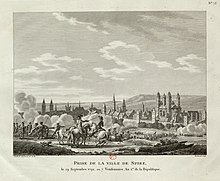Carl Alexander Holtzmann
Carl Alexander Holtzmann (* 1759 in Speyer ; † 1820 there ) was a merchant, Krappfabrikant , mayor of the city of Speyer and administrative councilor of the Mainz republic .
Life
Holtzmann, born in 1759, came from a merchant family. His father of the same name (1699–1784) was mayor of the imperial city of Speyer in the odd years from 1769 to 1783 ( ruling mayor since 1775) and senior master in the even years from 1770 until his death.
Like his father, Holtzmann was a member of the Imperial City Council. On September 30, 1792, ten days after the Valmy cannonade , Speyer was occupied by French revolutionary troops. With Carl Ludwig Petersen , the French set up the first provisional mayor in November . Holtzmann became president of the "Republican Society" - the Jacobin Club , Petersen his deputy. In the following year, Holtzmann was an administrative councilor of the short-lived Mainz republic for a few months.
In the following years there were several short-term recaptures by the empire . During these months the old constitution was restored. During the third French "occupation", the council and mayor were mostly in Mannheim . Holtzmann was first named as administrator in Speyer on January 20, 1795. From October 31, 1796 until New Year's Day 1814, Speyer came under constant French rule. In 1797 he acquired the municipal spice and tobacco mill from the nationalized national property. After the last remnants of the imperial city constitution had been removed on January 1, 1798 (after the Peace of Campo Formio ), municipalities were introduced in the canton of Speyer on January 23 . Maire Weiß had to resign his office to the municipal agent Holtzmann on February 8th .
In the first elections on February 5, 1801, Johann Adam Weiß received the trust of his fellow citizens. On the same day he was again mayor of the city. Holtzman took the post of the second Adjunkts (adjoint) . When the mayor was changed at the end of the French occupation, he was promoted to first adjunct in January 1814. After the death of F. Claus in 1819 he was officially named Mayor of Speyer before the by-election .
Holtzmann was a Freemason with the religious name Franciscus Aretinus . In 1789 he became a member of the Karlsruhe Lodge Carl for unity in the apprenticeship degree, in 1805 co-founder and treasurer of the Speyer lodge La grande famille and in 1810 an honorary member of the Frankenthal lodge.
family
Holtzmann was married to Anna Catharina, a daughter of the Electorate Chamber Councilor Georg Dantzer. The construction clerk Johann Bernhard Spatz became his son-in-law in 1808. The grandson Carl Alexander Spatz sat in first place in the Frankfurt National Assembly in 1848 . Other descendants include the architect Carl (Alexander) Spatz , the brain anatomist Hugo Spatz , the medical philosopher Wolfgang Jacob , the Romanist Daniel Jacob and the curator Ruth Noack . Holtzmann's nephew Georg Carl was remanded in custody for several months in 1849 for participating in the Palatinate uprising ( Mirbach powder robbery in Speyer).
Holtzmann's brother Joh. Michael Holtzmann (1774–1820) had the 29-page freedom pamphlet in 1814: “Demosthenes to the Germans. Ein Dialog “(Macklot, Karlsruhe 1814), which gained national recognition as an allegedly rebellious writing . Carl Julius , Adolf and Carl Heinrich Alexander Holtzmann are his famous sons.
See also
literature
- [Wilhelm] Harster: Speierer mayor list from 1289 to 1889. In: Communications of the Historical Association of the Palatinate . Gilardone, Speyer 1889. pp. 78-80.
Remarks
- ↑ DNB : Holtzmann, Johann Carl Alexander . (accessed on January 29, 2019)
- ^ The baseline between Speyer and Oggersheim. State Office for Surveying and Basic Geographic Information Rhineland-Palatinate 1997. ISBN 978-3-89637-332-8
- ↑ This official title was used until the Bavarian municipal code came into force.
- ^ Research platform of the Gotha Research Center: Johann Carl Alexander Holtzmann . (accessed on January 29, 2019)
- ↑ Rudolf H. Böttcher: Carl Alexander Spatz - A sparrow as a messenger of peace !. In: The family ties of the Palatinate Revolution 1848/1849. A contribution to the social history of a bourgeois revolution. Special issue of the Association for Palatinate-Rhenish Family Studies. Volume 14. Issue 6. Ludwigshafen am Rhein 1999. P. 260f.
- ^ Rudolf H. Böttcher: High treason suspects in custody. In: The family ties of the Palatinate Revolution 1848/1849. A contribution to the social history of a bourgeois revolution. Special issue of the Association for Palatinate-Rhenish Family Studies. Volume 14. Issue 6. Ludwigshafen am Rhein 1999. P. 321.
- ↑ Holtzmann, Johann Michael . (accessed on January 29, 2019)
- ↑ Censorship Police . In: National-Zeitung der Deutschen 1814. Sp. 599–602.
| personal data | |
|---|---|
| SURNAME | Holtzmann, Carl Alexander |
| ALTERNATIVE NAMES | Holtzmann, Johann Carl Alexander (Christian name) |
| BRIEF DESCRIPTION | Merchant, mayor and board member |
| DATE OF BIRTH | 1759 |
| PLACE OF BIRTH | Speyer |
| DATE OF DEATH | 1820 |
| Place of death | Speyer |
